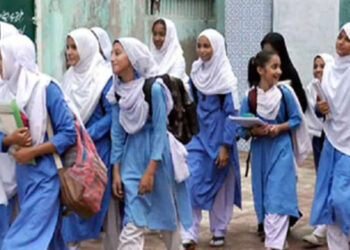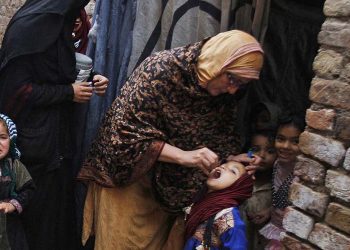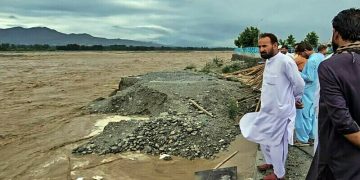Politics will likely consume much of Pakistan’s time and attention in 2023, as it did in 2022. The country’s turn to political instability last spring did not end with a dramatic no-confidence vote in parliament last April that ousted then Pakistani Prime Minister Imran Khan from office. Instability and polarization have only heightened since then: Khan has led a popular opposition movement against the incumbent coalition government and the military, staging a series of large rallies across the country through the year. Pakistan’s economy has been in crisis for months, predating the summer’s catastrophic floods. Inflation is backbreaking, the rupee’s value has fallen sharply, and its foreign reserves have now dropped to the precariously low level of $4.3 billion, enough to cover only one month’s worth of imports, raising the possibility of default. The struggle for power in Pakistan continues into 2023. While the incumbent government has not ceded to Khan’s demand for early elections, country-wide elections are constitutionally mandated to be held by October this year. It benefits the government politically to hold them off as long as it possibly can as it tries to dig itself out of Pakistan’s urgent economic crisis and its lackluster domestic performance (its diplomatic foreign policy approach has fared better, but that may not matter for elections). The last year has cost it precious political capital, and Khan’s party did very well in a set of by-elections held in July and October. The state has tried to mire Khan and his party in legal cases, relying on a familiar playbook used against opposition politicians in Pakistan, albeit to limited effect, with the courts’ involvement.
Pakistan Tehreek-i-Insaf (PTI) Chairman Imran Khan said that the only remedy to the economic crisis is conducting immediate, free and fair elections in order to bring political stability to the country. The former prime minister said the nation has been awakened and the days of political turncoats are not over. He said Pakistan was formed as an independent nation due to the efforts of his ideological leader Allama Iqbal and political leader Quaid-e-Azam. “Allah has given a conscience. We are an awakened nation”. Imran Khan said he is preparing the nation for ‘real freedom’ to protect themselves from these looters. He said that nations are not poor due to a lack of resources but massive corruption and plunder. Further, he said that current leaders only came to power to save their corruption rather than serving the nation. He said that NAB amendments were made to protect corruption worth Rs. 1,100 billion. He said that there has been unprecedented inflation in past four months, industry is closing and unemployment is rising. He further said overseas Pakistanis are our biggest asset which was witnessed when they raised Rs5 billion within hours for flood victims. He said that there are one million citizens abroad and the nation will progress if only a fraction of them contribute for development purposes. The cost of holding General Elections has increased by 261.52% in a span of just 10 years. With an estimated cost of Rs424 billion to make arrangements for electronic voting for 133 million native voters and 10 million overseas voters, the next general elections will likely be the most expensive ballot in the history of Pakistan. According to an estimate given by the ECP, the 2023 polls will cost the federal government roughly a 1,000 times more than the last three general elections, which totaled Rs28.6 billion. The employment of electronic voting arrangements for domestic and international voters accounts for a significant portion of the expense. Moreover, the estimated cost of the upcoming polls is close to the budget allocated for the country’s largest province, Baluchistan, for fiscal year 2021-22, which was Rs584.1 billion. It is estimated that nearly Rs47 billion will be spent on transportation, polling exercise, training, printing, remunerations and security, if the ECP goes with the traditional mode of balloting. But nearly Rs230 billion will be spent on electronic voting machines (EVMs) and its related expenses, while overseas voting operations are likely to cost Rs100 billion, say the major stakeholders.
It is the job of the political leadership to take the country out of economic crises and to move it on the path of development and efficiency, and they can be blamed for the failure and praised for success. The current political situation of Pakistan is facing a political and economic crisis and, economic crisis is the basis of political crisis due to which the country is trapped in a vortex. Imran Khan is refusing to accept the current government. On other hand, current government wants to avoid the demand for Imran Khan for elections as much as possible to avoid public anger due to the increase in prices. If we look at economic problems, they are becoming more and more serious; the foreign exchange reserves are melting like ice kept in the sun and flour is almost out of the reach of the poor people. Pakistan is an agricultural country and Pakistan imports billions of dollars’ worth of food from outside which is our political and economic failure. People have been forced to stand in long queues to buy flour in an agricultural country which is an alarming situation for our rulers as to how to get out of this situation as the mountains of problems are becoming Mount Everest.
The choice is ours. We can continue spending time blaming each other and the military, the political elite can avoid acknowledging that the military has worked hand in glove with governments of the time to push through national priorities, and keep ignoring the plight of the masses all too obvious to anyone and everyone. Or we can realize that polarization and discord is only benefiting Pakistan’s enemies and weakening our institutions. Make no mistake, we shall continue to face the challenges one after the other in times to come. Such is the state of the world. It is how we come together in face of adversity that will decide the outcome of these challenges. Our political differences and preferences need to take a back seat at this time of crisis. We won’t succeed unless we all work together. If there is one lesson to be drawn from the successes we have achieved over the past half a decade, this is it.






























